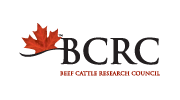Preventing Shipping Fever Pneumonia in Calves
| Project Code: | 3.26 |
| Completed: | August 2006 |
Project Title:
How does stress affect lung defenses and predispose calves to bacterial pneumonia?
Researchers:
Jeff Caswell jcaswell@uoguelph.ca
Shipping fever pneumonia is a respiratory disease typically found in calves that causes high fever, rapid and shallow respiration, coughing and a reduced appetite. The costs of prevention and treatment may vary but can be quite considerable for cattle producers.
It is believed that exposure to stress during transportation is one of the leading causes of the pneumonia. To identify exactly how stress predisposes calves to this illness, early indicators of response to stress and infection were investigated using calf studies and in vitro procedures. By reducing the prevalence of sick calves, this research could reduce treatment costs by $15 per head or more.
The primary objective of the research was to identify how stress predisposes calves to bacterial pneumonia, and more specifically, shipping fever pneumonia, with the aims of developing useful biomarkers to identify susceptible calves to develop better methods of preventing the pneumonia from infecting cattle to develop a simple method of accurately detecting groups of high-risk calves.
In particular, researchers set out to determine the specific reasons why weaning and transport-associated stresses increase the susceptibility of calves to the pneumonia in order to develop new methods to prevent and reduce occurrences. In addition, researchers aimed to identify the specific proteins in blood plasma that are present in stressed calves in order to develop a simple method of accurately detecting groups of high-risk calves as well as conditions that should be avoided in specific circumstances to protect calves from developing shipping fever pneumonia.
The project examined a combination of in vitro and in vivo (within a living organism) techniques using netrophils (airway cells) and lung wash fluids from cattle. By using this combination of techniques with natural stressors as well as stress artificially induced by the injection of corticosteroid and dexamethasone (steroid hormones involved in stress and immune response), researchers discovered two steroid hormones involved in stress response.
It was revealed that 24 proteins from the blood of calves are affected by stress. Most notably, haptoglobin, a protein in blood plasma, showed the greatest promise as a stress indicator. Weaning and transporting calves increased blood levels of haptoglobin 45 times as compared to unweaned calves that were not transported. Furthermore, haptoglobin can be analyzed through a commercially available assay kit, making it an ideal candidate to test through blood sampling.
It was also discovered that stress and viral infection predisposes calves to shipping fever pneumonia by reducing the production of specific antibacterial proteins in the respiratory tract of cattle. Cells lining the airways of calves are able to produce antibacterial proteins, such as defensins and lactoferrin. Both dexamethasone, a steroid hormone, and the bovine viral diarrhea (BVD) virus reduced the ability of these cells to make the necessary antibacterial proteins. These findings suggest that there may be genetic differences among cattle in their ability to produce these proteins and determining methods to improve their immunity to an infection of the lung may be feasible.
Through measuring proteins taken from blood or saliva, a chute-side test could be performed on calves arriving in feedlots after transport to identify stressed animals that are at greater risk of developing shipping fever pneumonia. Identifying these animals for special observation or targeted antibiotic use could reduce the overall use of antibiotics in the feedlot and improve the health of cattle.
Researchers also discovered the potential to identify animals for breeding that would produce calves with an enhanced immune system and ability to fight off infection. Conditions which are known to predispose cattle to bacterial pneumonia – stress, corticosteroid treatment, and the BVD virus infection – reduce the ability of airway cells to produce the necessary antibacterial proteins to help fight off infection. This indicates factors that may potentially lead to the cause of pneumonia as well as suggesting a process for preventing the disease. These results also identified a variation among calves in the production of the necessary antibacterial proteins, suggesting a genetic basis for these immune responses in the respiratory system.
Cattle producers care about the health and welfare of their animals. Research like this helps the industry develop new ideas and methods in its ongoing efforts to maintain a productive and healthy cattle herd.







